Tales of the Alhambra . . . and the Mezquita
Southern Spain was HOT. The Cordoba newspaper reported temperatures in the mid-30s, supposedly about 15 degrees above normal, and a street thermometer in Granada registered 40--about 104 degrees if you’re working in Fahrenheit.
Cordoba, May 14-15
We entered Cordoba on a Sunday afternoon, when most attractions and stores are shut tight, but we were able to take in the last day of the annual patio festival, when Cordobeses compete for the honor of having the city’s most beautiful patio. Despite the heat, therefore, we visited several of the entrants as evidenced by the photos below. Clearly most competitors, and probably the judges, subscribed to Mae West’s maxim that “too much of a good thing is just wonderful.”
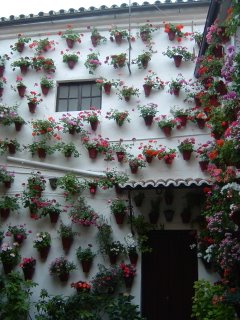
Córdoba patio competition
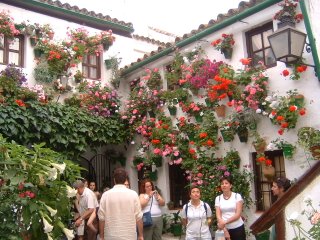
Córdoba patio competition
Our sightseeing in Cordoba centered on the Mezquita, the only large mosque left in Spain from the days of the Moors, when Cordoba had at one point more than one million inhabitants. The others were either demolished or converted into churches with accompanying artistic depredations. The Mezquita was spared because Charles V decided to build a large cathedral in its center. However, the horizontal extent of the mosque is so great that it swallows the cathedral, which is almost invisible through the forest of columns from the mosque’s entry. Bordering the Mezquita is the Alcázar, the Moorish and then Christian palace with the loveliest gardens we have seen in Spain to date.
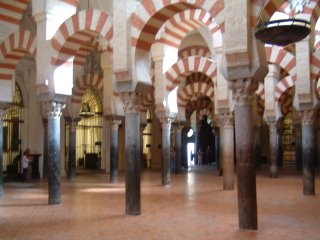
Mezquita interior
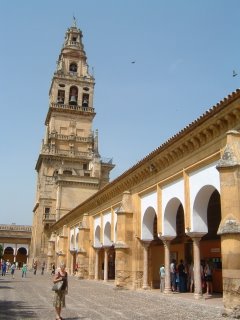
Mezquita: Torre del Alminar
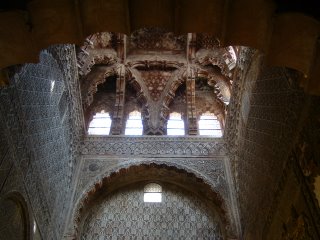
Mezquita: Capilla Real
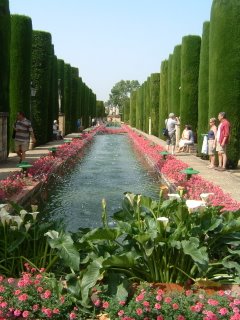
Alcázar gardens (Córdoba)
We had our first tapas experience in Cordoba at a venerable bar off the tourist route. As we were standing at the bar, Georgia was able to chat up the bartenders and learn the recipe for the house sangria. She also saw that some Cordobeses were ordering cold red wine and soda water, a sort of red wine spritzer known as “vino tinto de verano,” according to the bartenders. We recommend it.
Granada, May 16-17
After a short drive from Cordoba, we found Granada swathed in a steamy brown haze that looked to Todd’s California eye a great deal like smog. The setting was bizarre, for through the haze we could catch glimpses of the Sierra Nevada with snow-covered peaks approaching 3500 meters. Ski runs were visible, but the lifts didn’t seem to be operating.
After visiting the cathedral and paying our respects to Ferdinand and Isabella, who are interred there, we turned our attention to the Alhambra and the neighboring Generalife, which form perhaps the finest attraction in Spain. These palaces, built in the last 200-300 years of Moorish rule, initially attracted the attention of Charles V, who started to build his own palace on the site in the 16th Century but lost interest. As succeeding Spanish monarchs had no interest to begin with, the Moorish buildings were left to decay rather than to suffer alterations to match the tastes of subsequent eras. The site was “rediscovered” in the 1820s by Washington Irving, then an American diplomat in Madrid, whose “Tales of the Alhambra” became an international best seller and a spur to the refurbishment of the palaces.
We will let the following pictures tell the story of our magical visit, which lasted some five hours despite the heat. However, we were badly in need of drinks and lunch when we dragged ourselves at 3:00 into the patio restaurant of the Parador de Granada, which is located within the walls of the Alhambra.
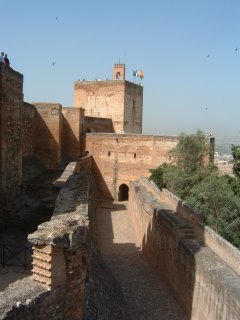
Alhambra: Torre de Armas
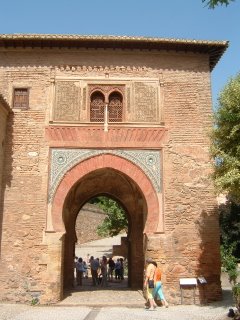
Alhambra: Puerta del Vino

Generalife
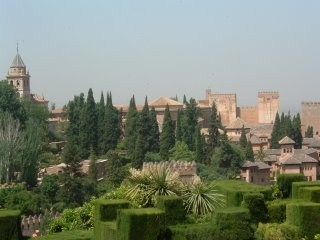
Alhambra from Generalife
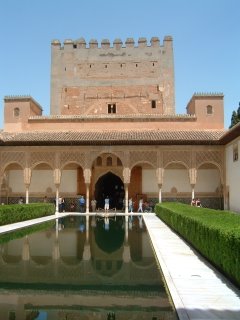
Alhambra: Patio de Arrayanes
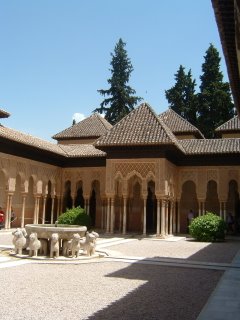
Alhambra: Patio de los Leones

0 Comments:
Post a Comment
<< Home